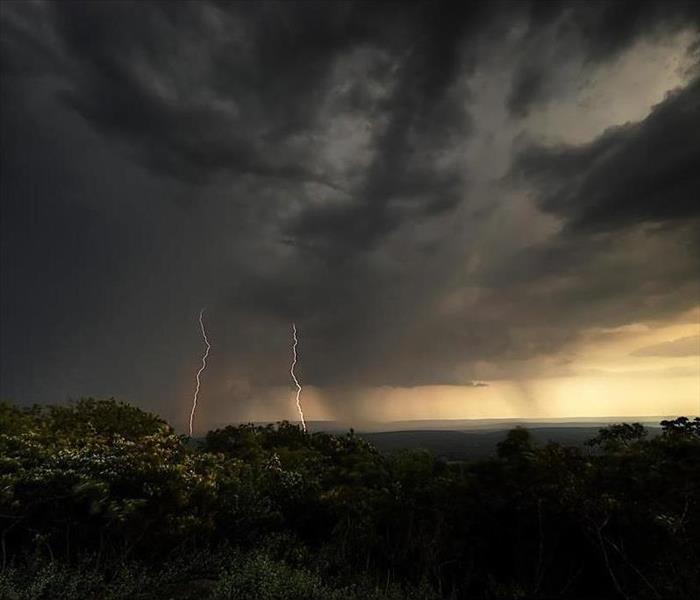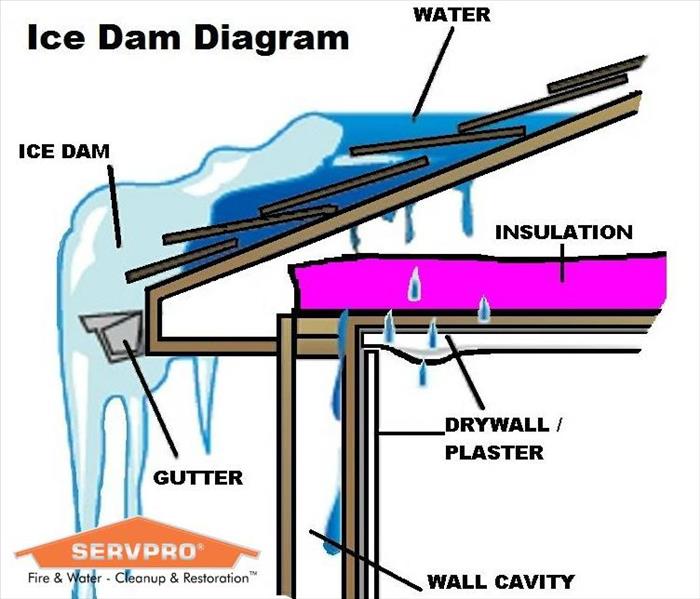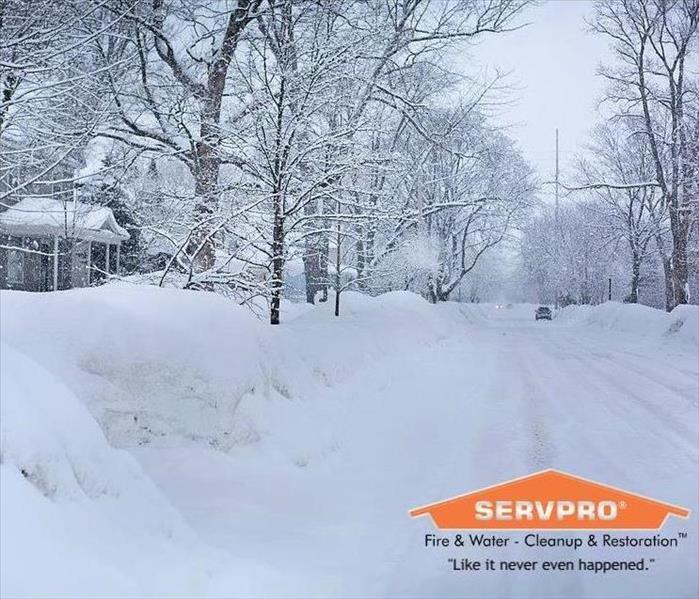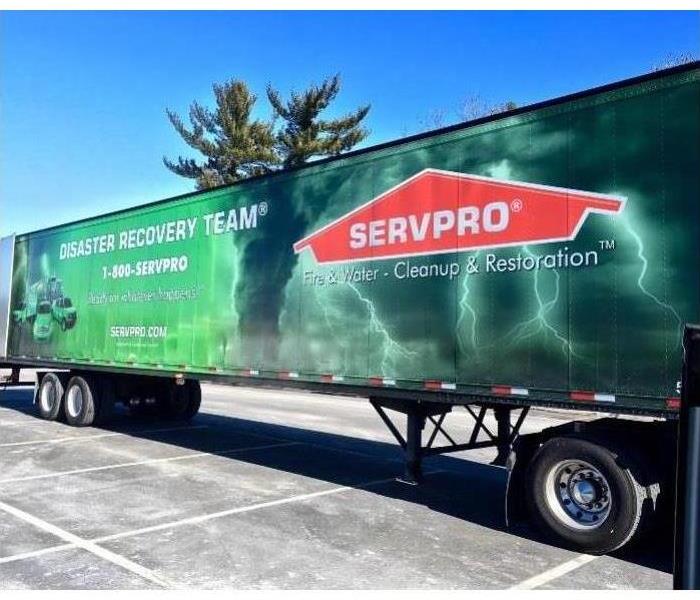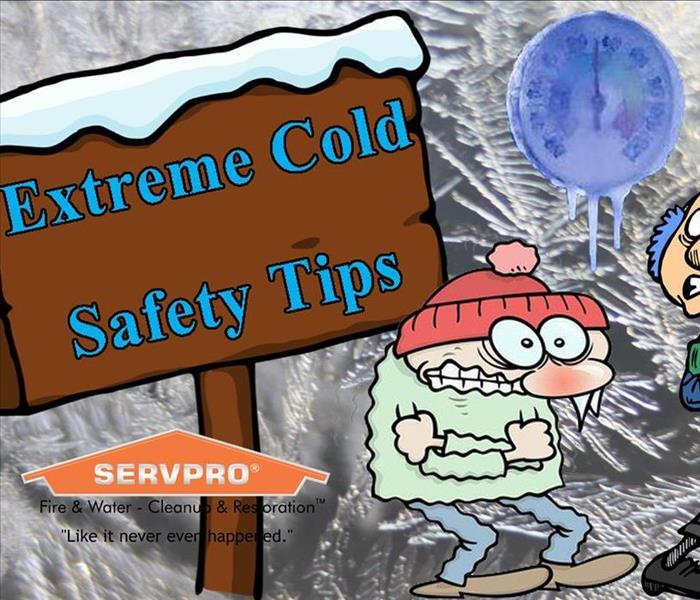Archived Storm Damage Blog Posts
Lightning Safety for Allendale, MI Residents
6/1/2022 (Permalink)
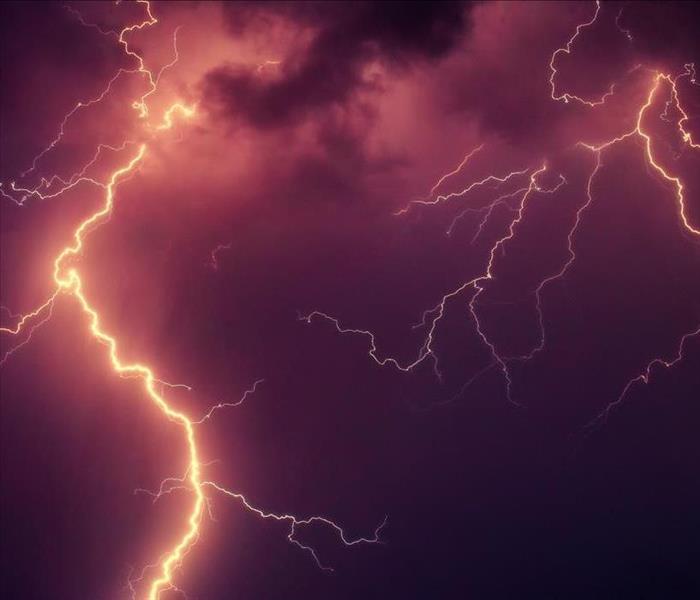 National Lightning Safety Awareness Week: June 19-25, 2022
National Lightning Safety Awareness Week: June 19-25, 2022
June 19-25th is National Lightning Safety Awareness Week. Back in 2001 it was started to call attention to lightning being an underrated killer. Since starting the week of awareness, U.S. lightning fatalities have dropped from roughly 55 per year to less that 30. It is believed that the reduction is largely due to greater awareness and people taking thunderstorms more seriously. During the week, challenge yourself to learn more about lightning and how to stay safe.
Lightning rods, and the accompanying protection system, are a way to keep your home safe from lightning. They are designed to protect a house or building from a direct lightning strike and, in particular, a lightning-initiated fire. Lightning protection systems do not prevent lightning from striking a structure, they intercept a lightning strike, providing a conductive path for the harmful electrical discharge that follows and disperses the energy safely into the ground. The components must be properly connected, or bonded, to minimize the chances for any sparks or side flashes to occur. Lightning rods protect a structure from direct lightning strike, but a complete protection system is needed to help prevent electrical surges and possible fires caused by lightning entering a structure via wires and pipes. Gas piping may also need lightning protection.
Lightning can enter a structure from three main ways: a direct strike, through wires or pipes that extend outside the structure, or through the ground. Once in a structure, lightning can travel the electrical, phone, plumbing, and radio/television reception systems. Lightning can also travel through metal wires or bars in concrete walls or flooring.
If your Allendale home has suffered a lightning-initiated fire, call SERVPRO of Holland / West Ottawa County today, 616-396-8180. We are Here to Help®
Common Types Of Storm Damage In Robinson, MI
5/23/2022 (Permalink)
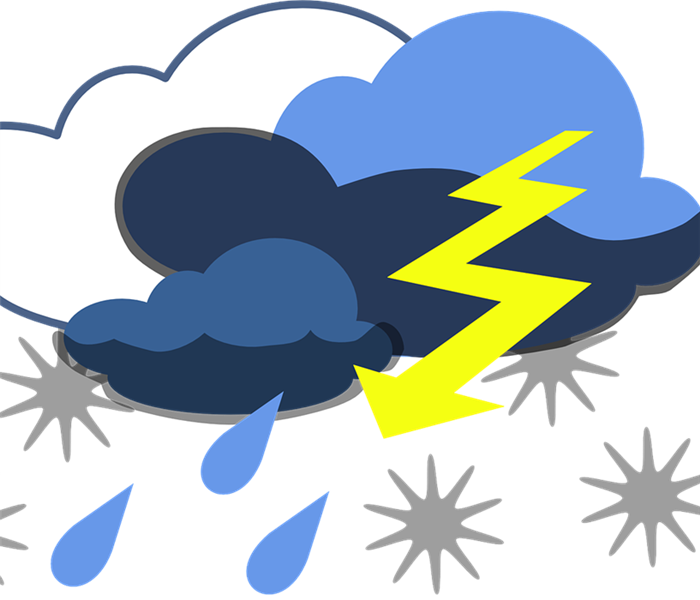 Has storm damage wreaked havoc on your property? SERVPRO of Holland / West Ottawa County is Here to help®
Has storm damage wreaked havoc on your property? SERVPRO of Holland / West Ottawa County is Here to help®
Weather can be unpredictable and severe storms can come out of nowhere. When storms blow through Robinson, they bring all sorts of conditions with them. The following are a few basic types of damage a storm can cause to your home or business.
Wind
Strong gusts of wind can harm your house or business in different ways. It can lift shingles from your roof, leaving it exposed to the elements and further damage. Winds can also carry debris and when that debris comes in contact with your business or home at a high speed, it can cause cracks and holes in siding and windows.
Water
Heavy rainfall can cause street flooding as well as flooding inside your home or business. Water wants to find the lowest point so it can find its way into your home from the ground level or a crack in your roof. Make sure to call SERVPRO of Holland / West Ottawa County if your home or business suffers from water damage to make sure it is mitigated properly.
Hail
Hail damage is difficult to identify the cause because the next day it melts away. Depending on the size of the hail, it can cause cracks and holes in siding, knock loose roofing materials, or shatter and chip windows.
If your home or business has suffered storm damage, call SERVPRO of Holland / West Ottawa County, 616-396-8180. We're Here to help® 24/7
A Tree Fell On My Home In Zeeland, MI - Now What To Do?
5/10/2022 (Permalink)
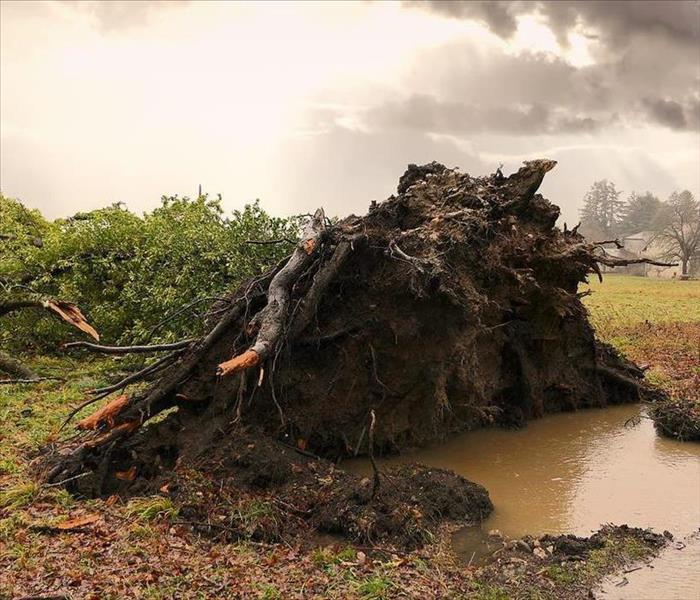 Take the necessary steps when a tree falls on your home.
Take the necessary steps when a tree falls on your home.
When a tree falls on your roof, or any part of your home, it can cause many problems. It can damage your home's structure, it exposes your home to the elements, and increases risk of other damage from electrical sources. The following are steps of who to call after a tree falls on your Zeeland, MI home.
- Make contact with necessary individuals - first you will want to call your insurance company to consider coverage. Then call a tree removal company, someone to tarp the roof, and a roofer. Lastly, call SERVPRO of Holland / West Ottawa County if you need water mitigation inside your home.
- Remove tree - we are not able to address water issues inside the home until the damaged area of the roof is cleared.
- Tarp exposed areas - a fallen tree most likely will cause damage to the roof, leaving it exposed. To ensure outside elements do not get in and cause more damage, tarping temporarily protects your home so SERVPRO of Holland / West Ottawa County can mitigate the water damage inside.
- Contact a roofing contractor - you can not leave your roof tarped forever. You will need to get with a roofing company to determine the next phase of repairs to your roof.
A fallen tree can cause a lot of damage and stress. The above steps can help ease that stress. Call SERVPRO of Holland / West Ottawa County today, 616-396-8180
Severe Wind Damage In Spring Lake, MI? SERVPRO of Holland / West Ottawa County Can Help
5/3/2022 (Permalink)
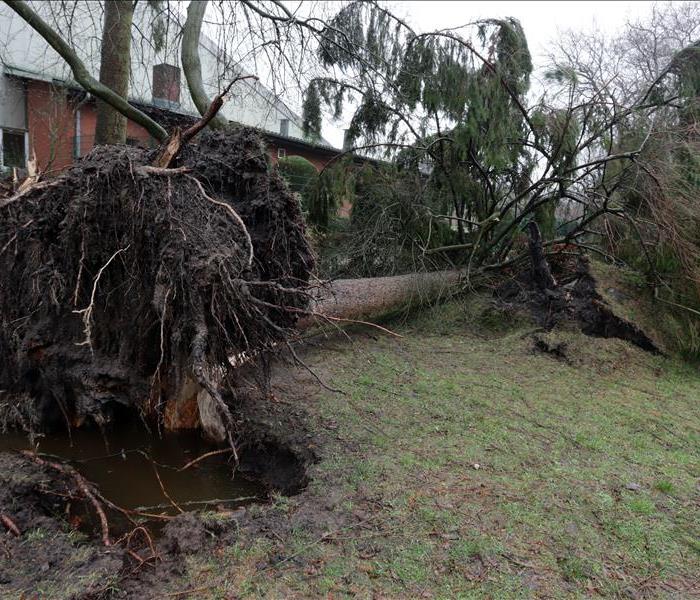 Tips for protecting yourself during a power outage.
Tips for protecting yourself during a power outage.
Spring Lake, MI can experience more severe winds than inward because of the proximity to Lake Michigan. Many of these wind storms can cause power outages. SERVPRO of Holland / West Ottawa County responds to storm damage emergencies throughout the year. Below are some tips for protecting yourself during a power outage:
- Keep freezers and refrigerators closed.
- Only use generators outdoors and away from windows.
- Do not use a gas stove to heat your home.
- Disconnect appliances and electronics to avoid damage from electrical surges.
- Use alternate plans for refrigerating medicines or power-dependent medical devices.
- If safe, go to an alternate location for heat or cooling.
- Check on your neighbors.
If your home or business is damaged by wind or other severe weather, SERVPRO of Holland / West Ottawa County has the equipment, training, and experience to help make it "Like it never even happened." Call us today, 616-396-8180
Storm Damage to Your Grand Haven Home in Winter
12/14/2021 (Permalink)
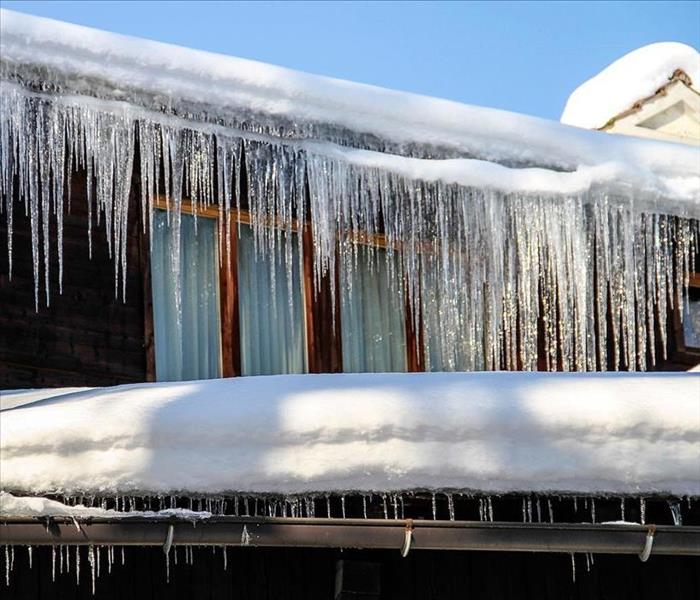 Hanging icicles can become a potential water damage situation.
Hanging icicles can become a potential water damage situation.
Grand Haven residents beware! The Farmers Almanac is predicting temperatures and conditions to be freezing this year in Michigan. Time to pull out the warmest of the warm clothes, boots, and coats! There are different possible types of storm damage that can happen to your home or business in the winter months. The following are a few to be advised of:
- Strong winds may loosen shingles on your roof.
- Strong winds can potentially pick up rocks or other small items and throw them into your siding or windows.
- Snow or ice can potentially make its way into holes or crack in your foundation, roof, or siding.
- Tree branches could fall onto your roof or scrape against your siding or windows.
- Ice dams can block water from flowing down gutters and force water under roof shingles.
- Heavy snows can cause your roof to collapse.
There are actions that you can take prior to the storm to prepare your home or business. Check out our blog, Protect Your Holland Home From Winter Storm Damage, for tips on what you can do to prevent winter storm damage to your home or business.
Have winter storm damage to your home or business? Call SERVPRO of Holland / West Ottawa County to assess the damage, 616-396-8180, we are Here to help®
Protect Your Holland Home From Winter Storm Damage
12/9/2021 (Permalink)
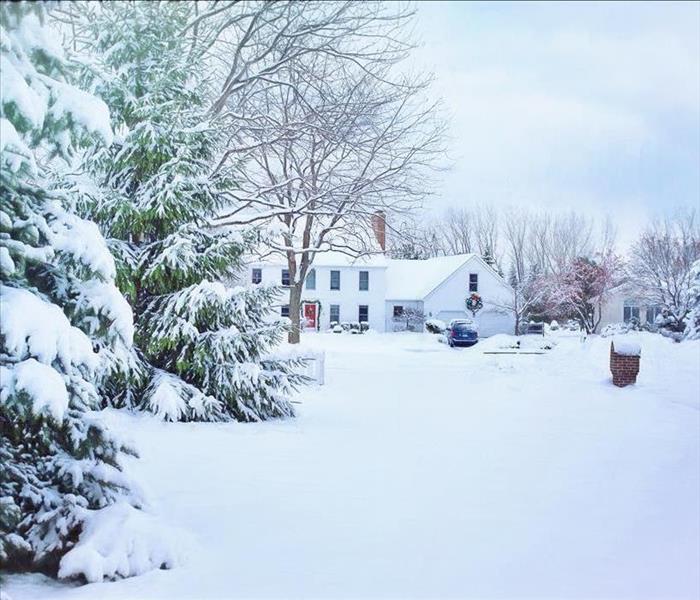 Make sure your home or business is ready for the next winter storm before it hits.
Make sure your home or business is ready for the next winter storm before it hits.
West Michigan winters mean frigid temperatures, lots of snow, and potential damage to your home or business from storms. Take action now with these easy ways to help prevent property damage during the next winter storm.
- Frozen pipes are the number one casualty in the winter months. An easy solution is to wrap your basement and crawl space pipes with insulation.
- Make sure your gutters and drains are free of debris to help avoid cracking gutters, ice dam buildup, or melting snow traveling into your basement.
- Trim any overhanging branches away from your roof, sidewalks, and driveway; or hire a professional tree service to remove threatening branches.
Has a winter storm affected your Holland home or business? Call SERVPRO of Holland / West Ottawa County today, 616-396-8180, we are Here to help®
Tips To Prepare Yourself and Your Furry Kids for a Storm
8/24/2021 (Permalink)
 Prepare your furry kids for a storm
Prepare your furry kids for a storm
Severe weather can turn a normal day into a disaster. There are several emergency plans that you can follow to keep your family safe, but have you thought about your pet? Have you planned for them? The following are some tips to keep your whole family safe, furry kids included.
- Create a Plan - if an emergency situation arises and you need to leave your home, do you have a plan on where you and your pets will stay? Make a list of hotels that are pet friendly and talk with your friends and family to see if they would be willing to accommodate all of you. Unfortunately, at Red Cross shelters only service animals are allowed.
- Make Sure Your Pets Can Be Identified - check that your pets collars and tags are up-to-date. If they are microchipped that is even better.
- Have Pet Carriers Accessible - make sure to have carriers, harnesses, and leashes readily available.
- Practice - consider practicing your emergency plan with your family and pets. Cars rides can be stressful for some pets. By practicing ahead of time, your pets will hopefully become more comfortable with going in the car.
- Hide and Seek - stressful situations cause some pets to hide. If yours is one of those, be sure to know their hiding places in case you need to evacuate quickly.
- Emergency Kit - preparation is key. A few items to include in your pets emergency kit are food, drinking water, bowls, litter box, medications, medical records, toys, waste bags, calming chews, additional leashes/harnesses.
Has a storm affected your Robinson home? Call SERVPRO of Holland/West Ottawa County today, 616-396-8180, we are Here to Help
Assistance for Emergency Storm Damage in Nunica, MI
6/2/2021 (Permalink)
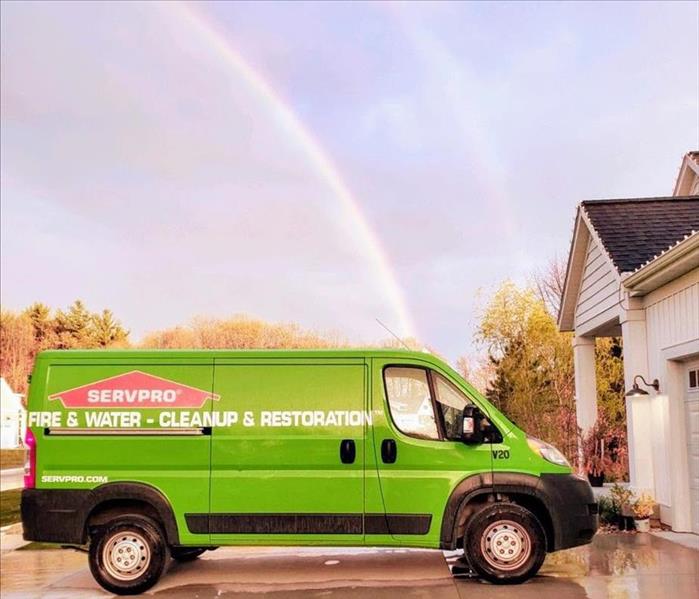 We bring good luck wherever we go!
We bring good luck wherever we go!
Storm damage does not always strike during regular business hours. Did you know that SERVPRO of Holland/West Ottawa County offers emergency service 24 hours a day, 365 days a year? We are Here to Help Nunica homeowners and business owners secure their property and start mitigation after an emergency event quickly.
SERVPRO of Holland/West Ottawa County can provide temporary protective measures to prevent additional damage to your property after a disaster. If after a fire or flood your contents need to be removed from your affected property during the restoration process, SERVPRO of Holland/West Ottawa County can pack your contents and move them to our warehouse or storage until the restoration process is complete. Once restoration is complete, your contents are returned to your property.
Has your business or home experienced damage from a recent storm? Call SERVPRO of Holland/West Ottawa County to help, 616-396-8180
When Storms or Floods hit Ferrysburg, SERVPRO is ready!
5/25/2021 (Permalink)
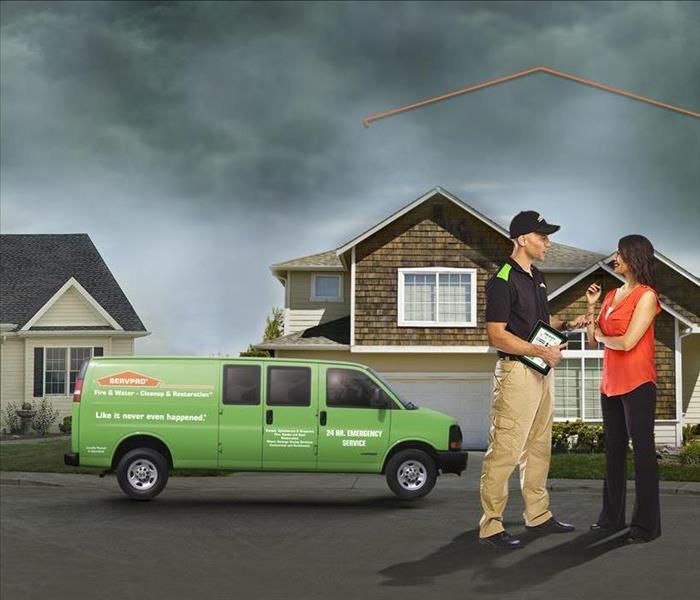 Our highly trained crews are ready to respond 24/7 to storm or flood damage in Ferrysburg.
Our highly trained crews are ready to respond 24/7 to storm or flood damage in Ferrysburg.
SERVPRO of Holland/West Ottawa County specializes in storm and flood damage restoration. Our crews are highly trained and we use specialized equipment to restore your property to its pre-storm condition.
Faster Response
Since we are locally owned and operated, we are able to respond quicker with the right resources, which is extremely important. A fast response lessens the damage, limits further damage, and reduces the restoration cost.
Resources to Handle Floods and Storms
When storms hit Ferrysburg, we can scale our resources to handle a large storm or flooding disaster. We can access equipment and personnel from a network of more than 1,700 Franchises across the country and elite Disaster Recovery Teams that are strategically located throughout the United States.
Have Storm or Flood Damage? Call Us Today 616-396-8180
Preparation is Key for Severe Weather in Allendale, MI
5/12/2021 (Permalink)
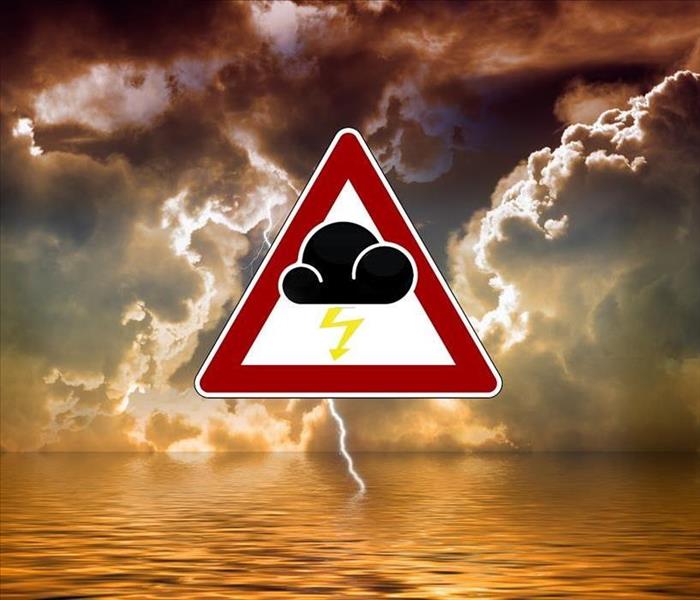 Make sure you're prepared for when severe weather hits.
Make sure you're prepared for when severe weather hits.
Severe weather can be terrifying. Preparation is key to staying safe and minimizing impacts in your Allendale home. The following are tips from the National Weather Service to make sure you are prepared when the next weather weather hits:
- Be Weather-Ready: Check the forecast regularly to see if you're at risk for severe weather. Listen to local news to stay informed about severe thunderstorm watches and warnings.
- Sign Up for Notifications: Know how your community sends warning. Some communities have outdoor sirens while others depend on media and smart phones to alert residents of severe storms.
- Create a Communications Plan: Have a family plan that includes an emergency meeting place and other pertinent information. Pick a safe room in your home such as a basement, storm cellar, or an interior room on the lowest floor with no windows.
- Practice Your Plan: Conduct a family severe weather drill regularly so everyone knows what to do if a damaging wind, large hail, or tornado is approaching. Make sure all members of your family know to go to the meeting place when severe warnings are issued and don't forget pets if time allows.
- Prepare Your Home: Keep trees and branches trimmed near your house. If you have time before severe weather hits, secure loose objects, closed windows and doors, and move any valuable items inside or under a sturdy structure.
- Help Your Neighbor: Encourage your loved ones to prepare for weather weather. Take CPR training so you can help if someone is hurt during a severe weather event.
Has your home been affected by storm damage? SERVPRO of Holland/West Ottawa County is Here to Help, 616-396-8180
Do You Know Your Safe Place If A Storm Strikes in West Olive, MI?
5/4/2021 (Permalink)
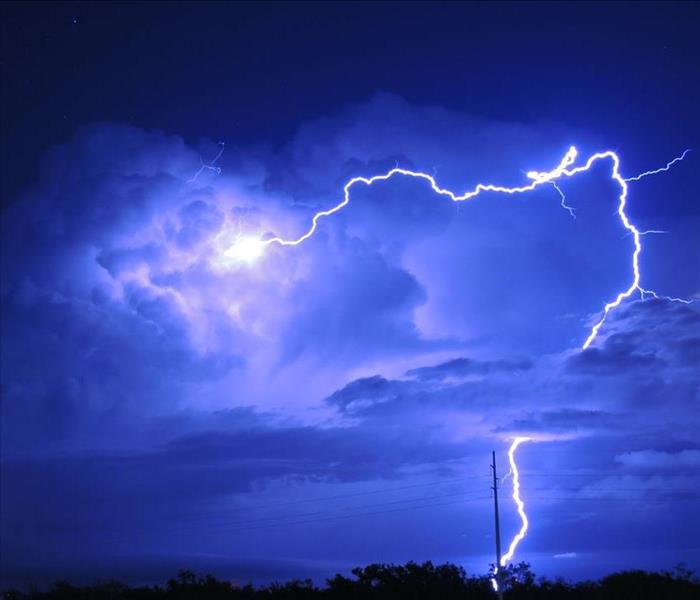 Know Your Safe Place before extreme weather hits.
Know Your Safe Place before extreme weather hits.
When preparing for extreme weather in West Olive, knowing your safe place is a simple but potentially life saving action. If you are unsure where your safe place is, we share some tips below from The National Weather Service's Spring Safety Campaign, Know Your Safe Place.
Your Safe Place From Tornadoes
Tornadoes can be extremely dangerous so if you receive a tornado warning, take shelter immediately. Safe places are storm shelters and basements, but if not available, an interior room without windows can also be protective.
Your Safe Place From Lightning
Lightning strikes the U.S. 25 millions times a year, which sometimes results in death or permanent injury. If you hear thunder or see lightning, take shelter immediately. Indoors or inside a hard-topped and enclosed vehicle is the safest place.
Your Safe Place From Heat
Heat is the leading cause of weather-related deaths most years. During extreme heat, stay inside, keep cool, and stay hydrated.
Your Safe Place From Flooding
During high winds, tree damage is expected. Indoors, away from windows, in an interior room is the safest place. Prevent damage to your property by trimming loose branches and parking away from trees.
If you property has suffered storm damage, call SERVPRO of Holland/West Ottawa County, we are Here to Help, 616-3965-8180
Generator Safety Tips for Your Coopersville, MI Home
4/19/2021 (Permalink)
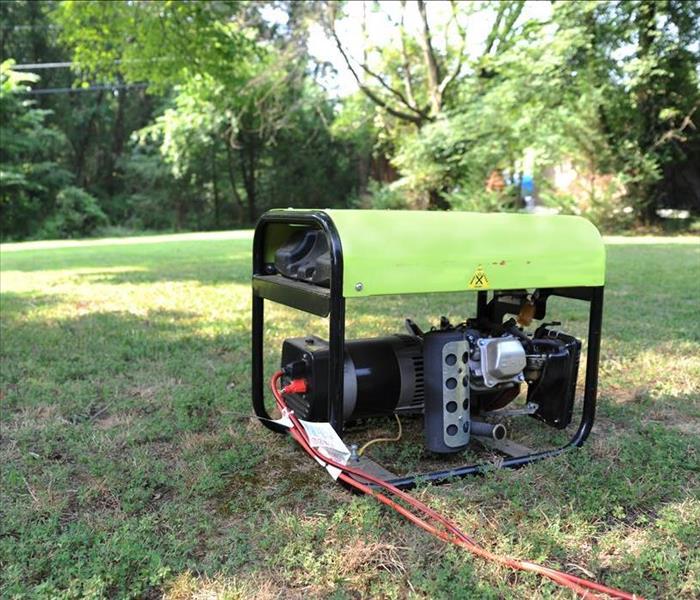 Check out these safety tips before using your portable generator.
Check out these safety tips before using your portable generator.
When bad weather strikes and the power goes out, it is helpful to have a generator on hand to keep your Coopersville home running. Below are tips on how to safely operate your generator from the U.S. Fire Administration and SERVPRO of Holland/West Ottawa County.
- Use portable generators outdoors in well ventilated areas away from doors, windows, and vents.
- Make sure you have carbon monoxide alarms in your home.
- Do not use a generator in a wet area or with wet hands as this can cause shock or electrocution.
- Connect appliances to the generator with heavy-duty extension cords.
- Do not fuel your generator when it is running. Spilling gas on a hot engine can cause a fire.
- Run your generator every few months to make sure that it is still functioning.
If your home experiences damage from a storm, call SERVPRO of Holland/West Ottawa County today, 616-396-8180
Winter Weather Preparation
12/17/2020 (Permalink)
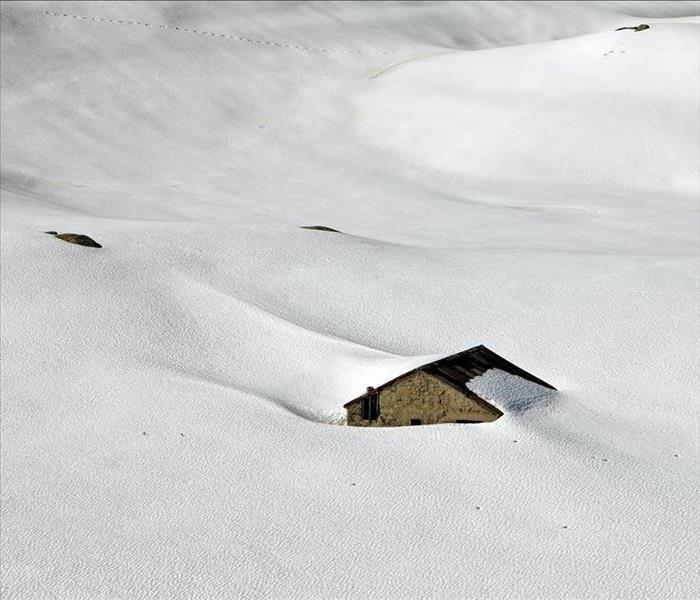 Keep yourself and your home safe this winter.
Keep yourself and your home safe this winter.
Michigan winter weather is quickly approaching. SERVPRO of Holland/W. Ottawa County knows all about severe weather and have helped many families and businesses in Ottawa County mitigate storm damage over the years.
Being prepared for inclement weather and knowing the difference between Advisories, Watches, and Warnings can help you stay safe this winter. The following are definitions of various winter warnings from the Federal Emergency Management Agency (FEMA):
Advisory: issued when snow, blowing snow, ice, sleet, or a combination of these wintry elements is expected by conditions should not be hazardous enough to meet Warning criteria. Be prepared for winter driving conditions and possible travel difficulties. Use caution when driving.
Watch: issued when conditions are favorable for a significant winter storm event. Heavy sleet, heavy snow, ice storms, blowing snow, or a combination of these events are possible.
Warning: issued for a significant winter weather event including snow, sleet, blowing snow, or a combination of these hazards. Travel will become difficult or impossible in some situations. Delay your travel plans until conditions improve.
SERVPRO of Holland/W. Ottawa County has a team of IICRC trained technicians available 24 hours a day, 7 days a week. Call (616) 396-8180 and we'll restore your storm damage, "Like it never even happened."
Hailstorm Tips
6/3/2020 (Permalink)
We can experience some pretty severe weather in Michigan. Although it does not happen often, thunderstorms sometimes accompany hailstorms. Here are some tips for dealing with hailstorms:
- Like any severe weather preparation, have a plan in place. It is always best to have an emergency kit that contains flashlights, water, a radio, etc.
- Always stay informed. Be sure to check the future forecasts on a daily basis. This will help prevent getting caught off guard by severe weather. The sooner you know, the more time you have to prepare!
- Move inside and stay inside. If a thunderstorm or hailstorm is on its way, move indoors and stay there until the storm passes. If you have a garage, move vehicles inside as well and do not let pets outdoors. Close you blinds and shades for safety in case hail shatters your windows.
- Check your roof after a hailstorm. Hail widely varies in size and does have the ability to do severe damage to your roof. Inspecting it can help prevent surprise water damage when the next storm hits!
Severe Weather Preparation
5/26/2020 (Permalink)
Michigan has its fair share of bad weather. We are lucky enough not to experience many natural disasters, but severe thunderstorms are not uncommon. That is why it is always best to be prepared! Here are some great tips on how you can be ready for whatever mother nature throws your way:
- Check the forecast regularly to be aware of any severe weather on its way
- If available, sign up for local severe weather notifications
- Create a safety plan. Be sure everybody who lives in the home knows where to take shelter if severe weather strikes
- Prepare your home by trimming back trees and branches that are too close to your house and securing any loose objects
- Check on your neighbors. If you encounter severe weather, there is always the chance that those around you may need assistance, whether physically or medically
Do your best to always be prepared for severe weather!
Pre-Flood Safety
5/26/2020 (Permalink)
If you have watched the news recently, you may have noticed all of the flooding Michigan has experienced. Many of these residents have never experienced flooding before. Here are some tips on how you can prepare:
- Create a communication and evacuation plan
- Assemble an emergency kit that contains at least 3 days of food and water
- Have an evacuation route in mind (the quickest and safest way to get to high ground)
- Sign up for local notifications that a flood is imminent
- Prepare your home by protecting it with sandbags and purchasing flood insurance if you live in a flood prone area
- Pack all of the essentials in advance so that evacuation can be quick and easy
- Charge electronics and have backup batteries
- Evacuate as soon as possible
Weather can be very unpredictable. It is always important to be prepared!
Ottawa County State Of Emergency
5/21/2020 (Permalink)
This spring has been especially bad when it comes to flooding. Most residents would agree that the water table had risen pretty dramatically last fall/early winter and never receded much. This resulted in minor rain storms producing some flooding. When bad storms hit, residents know that they are in for some issues. These rain storms over the last few weeks have left many homeowners and business owners with flooded property so bad that they cannot begin repairs until the water recedes. The county, recognizing the severity of the flooding, issued a local state of emergency. This allows officials to coordinate additional resources for their response. Residents are urged to take action to limit any flooding damage to their property. Anyone who has suffered flooding damage is asked to fill out a self reporting damage survey form online here.
Spring Storm Tips
4/23/2020 (Permalink)
Each year there tends to be at least a few spring thunderstorms that are pretty severe. After making it through a pretty uneventful winter, these storms can catch you by surprise. Here are some tips that can help you prepare for whatever mother nature sends your way:
- Always have a battery powered radio on hand
- Always have multiple flashlights and candles prepared for a power outage
- When leaving on vacation, unplug appliances and other electronics other than lights that are on a timer
- Stay indoors
- If a major store is immanent, close shutters and board windows if possible
- Keep an eye on large trees close to your home that could cause damage if they fall. Cut them back if necessary
- Always have extra food and water on hand
- Have a good shelter spot for very severe storms
There is no such thing as being too prepared for severe weather!
Winter Storms Have Arrived
12/20/2019 (Permalink)
Winter is here and it typically brings along a variety of concerns. One of which being nasty storms and the damage they can do to your home or business. Many people who have experienced storm damage in the past can attest to it being pretty costly. That is why it is important to take the time to make sure you are prepared for whatever may happen. Put together emergency kits and purchase extra food in case you are unable to leave your house for a couple days. Large snow storms can make travel treacherous. Insulate your pipes to help prevent frozen disasters. A pipe break has the ability to dump large quantities of water into your home in a short amount of time. Clean your gutters to prevent ice dams. This will also help prevent you from having to replace broken gutters every year. Also, have our number on speed dial. Should a disaster occur, time is of the essence to prevent further damage to your home or business. We are available 24/7 and will be there in your time of need.
SERVPRO of Holland/W. Ottawa County: 616-396-8180
High Winds
8/5/2019 (Permalink)
Often times with summer storms come high winds. We have dealt with a variety of cases in which high winds cause structural damage to customer's homes and businesses resulting in the need for restoration. If your home or business experiences damage during a storm such as roof damage from fallen trees and branches, it is important to get it repaired as quickly as possible. The sooner structural damage is taken care of, the less likely it is that you will need restoration services. A damaged roof can easily allow access of water. This moisture can remain undetected until it turns into a serious problem. Luckily, we have equipment that can detect hidden moisture and address it as quickly as possible to prevent mold growth. If you feel that your home or business may have experienced water damage, call today!
Have Water or Flood Damage?
Call Us Today – (616) 396-8180
Storm Safety
6/28/2019 (Permalink)
Many of us do not realize how dangerous thunderstorms can be. Even though storm related injuries are not super common, storm safety is still something that should be practiced by all. The CDC offers up some great tips on how to be safe during thunderstorms. Even though being outdoors is the most dangerous situation, about one-third of lightning-strike injuries occur indoors. A few indoor precautions that they highlight are:
- Avoid water as lightning can travel through plumbing.
- Avoid electronic equipment of all types. Lightning can travel through electrical systems and radio and television reception systems.
- Avoid corded phones. However, cordless or cellular phones are safe to use during a storm.
- Avoid concrete floors and walls.
Although lightning strikes resulting in injury are rare, they do happen so always practice storm safety!
Summer Storms Are Here
6/3/2019 (Permalink)
The summer season is upon us and with it comes the summer storms. Each year we seem to experience a variety of summer storms that range in severity and the damage that they can cause. It is not uncommon for these storms to bring home damage resulting from flooding, power outages, strong winds, fallen trees and branches, and more. Many times when these storms come, they come quickly and violently with not much time to prepare. Take the time now to ensure that your home is equipped for the storms we may experience this summer.
If your home happens to experience damage resulting from these storms, we are here to help. Our 24-hour service means that we are available to assist you day or night.
Summer Storm Ready?
6/3/2019 (Permalink)
It is that time of year where violent thunderstorms can appear very quickly. Although the increases in technology have given us more of a heads up when these storms are going to take place, they can still be difficult to predict. It is always important to make sure that you have a plan in place when these storms occur. Create a checklist and an emergency plan with your family so that all the essentials that you may need are easily obtainable. These items could include flashlights, food, water, and more. Also educate your children on thunderstorm safety such as remaining indoors, staying away from metal objects, avoiding water and electronic equipment, and more. Many of these safety precautions slip our mind but could potentially save your life. Be prepared for the summer storms ahead.
Keep A Radio Nearby
6/3/2019 (Permalink)
Many individuals living in today's society, with the technology we have, believe that going "Back To Basics" isn't necessary. Who needs a radio when we all have smartphones! Although it may seem silly, it doesn't hurt to have a working portable radio in your home in case of an emergency. Thunderstorms often bring power outages that are very inconvenient. If your smartphone is dead or close to being dead and you don't have a portable charger, it is no longer useful. This is where that little portable radio could really come in handy. Nobody likes to feel helpless. A radio can allow you to listen to local weather stations to know what is going on and when the storm will pass. Never be unprepared when it comes to planning for summer storms!
Winter Storms Causing Ice Dams
1/3/2019 (Permalink)
Although a mild winter is nice, it also brings about an increased chance of water damage from ice dams. An ice dam is when a ridge of ice forms at the edge of a roof. It prevents melting snow and rain from draining off the roof. Snow and rain storms flip-flopping regularly is a recipe for disaster when it comes to ice dams. As the water gets backed up behind the ice, it can easily find its way under your shingles and effect your ceiling and wall cavities. This can bring about many more issues such as droopy ceilings and moldy wall cavities.
There are a couple different ways to prevent ice dams and ice dam damage. The first is that many homeowners will have heating cables installed to prevent ice from building up. The second is having a contractor evaluate your insulation and ventilation in order to recommend solutions to possible ice dam concerns.
If you experience water damage due to ice dams, SERVPRO of Holland/W. Ottawa County is here to help!
Water Damage & Flooding
8/28/2018 (Permalink)
When inclement weather strikes, are you prepared for the worst? Storms can happen at anytime and can cause serious damage to homes and businesses. When water begins to flood basements or seep through cracks in the roof, damage begins taking place immediately. The longer your home or business is flooded, the more damage accrues. If recent storms have caused flooding or a pipe has burst, our highly trained technicians are ready 24 hours a day, 7 days a week, to respond immediately to flood or water damage at your home or business. We have the experience, expertise, and training to restore your home or business quickly and properly. We use advanced inspection and extraction equipment to find the water and remove it as quickly as possible. Our local technicians will closely monitor and document the drying process to ensure your property is back to normal.
If you have storm or flood damage, call SERVPRO of Holland/W. Ottawa Co. at: (616) 396-8180
Going on VACATION? Must Do's Before You Leave
7/6/2018 (Permalink)
Most American plan on taking at least one family vacation every year. When traveling for more than a couple of days, be sure your home is properly protected. Windows and doors being locked are a given however are you're missing steps to be sure your home will be the same when you return?
Do Not Let People Know Your Home is Empty.
- Put a HOLD on your mail and newspaper service.
- Continue Lawn Care Services to make your home seem less abandoned.
- Set your indoor and outdoor lights on a timer or install motion detectors to deter burglars.
- Post vacation pictures on social media when you return.
Accident Proof Your Home.
- Check and replace batteries in your thermostat, smoke detectors, carbon monoxide detectors, security devices, cameras, motion detectors, etc.
- Shut off the main water supply or the water pump. We just received a call today from a homeowner who has been on vacation for the last week and his daughter just discovered that a water supply line sprung a leak on the second floor of their home causing damages to all three levels. All the drywall on the first level and in the finished basement level had fallen in, water was bubbled behind the paint in the walls and there were inches of standing water that had not yet found it's way to the lowest point in the home. Imagine coming home to that. This type of situation happens more often that you think.
- Switch your water heater to vacation mode or turn it off to conserve energy.
- Unplug your electronics to prevent a power surge or make sure they are plugged into a surge protector.
- If losing power is typical during a storm or heavy rain, freeze a cup of water and place a penny on top of the ice before you leave for vacation. When you return home, check to see if the penny is frozen on top or the bottom of the cup. This will tell you if your home lost power while you were on vacation. Inspect the food in your refrigerator or freezer.
While these tips may be time consuming before you go on vacation, they could save you a huge headache when you return.
Are you Storm Ready?
6/4/2018 (Permalink)
Every year Americans are faced with thunderstorms, floods, flash floods, tornadoes, and hurricanes.
When the President declares an emergency because of weather related issues, around 98% of those disasters lead to about 500 deaths per year and almost $15 billion in damages. Being aware of the risk of severe weather, taking action and being an example are just a couple of steps to take in being better prepared to save your life and helping to save the lives of others.
Being aware of the risk: The first step to becoming Storm Ready is to understand what types of weather can effect where you work and live and how that weather can impact you, your family and your business. Be aware of the weather in your area by checking the forecast regularly. Purchase a weather radio and also learn about wireless Emergency Weather Alerts. Severe weather comes in so many different forms so your shelter plan should also include all types of local hazards.
Taking Action: Create a communication plan for your home or business to prepare for severe weather. Emergency kits can be purchased. Be sure to keep important information and valuables in a safe place.
Be an Example: Once you have prepared for severe weather, share your story with family, friends and co-workers on social media platforms such as Facebook, Instagram, Twitter and LinkedIn. Your preparedness story will be an inspiration to others to hopefully do the same.
Contact SERVPRO of Holland/W. Ottawa County for more readiness tips and tools including SERVPRO's Emergency Ready Profile (ERP). Having a no cost assessment of your facility can help minimize business interruption in the event of a disaster.
Contact SERVPRO of Holland/W. Ottawa County to learn more and be ready for whatever happens.
How Important is a Weather Radio?
6/4/2018 (Permalink)
Did you know that a Weather Radio is the most reliable source for weather alerts? Because of it's reliability, purchasing a good quality weather radio is one of the best precautions you can take. The weather radio is designed to alert you to potentially dangerous weather situations like a storm that could produce hail or an approaching tornado. This alert warns you ahead of time so you can seek shelter.
Weather radios are very affordable and have many advancements from where they used to be. A basic weather radio can average around $30 and you can program it to send you weather alerts of your choice.
There are key features to look for when shopping for a weather radio:
- Alerts that can be reviewed so you can scroll thru the alerts and silence the ones you do not wish to hear.
- Programmable Alert for Specific Area Message Encoding (SAME) which alerts when specific counties are threatened and ensures you only receive alerts for your county.
- System that is easily programmable.
Contacting your local National Weather Service Office is always an option if you need help programming your weather radio. Or visit the NOAA Weather Raodio webiste at www.nws.noaa.gov/nwr/ for additional information including county codes for your state.
Summer Storm Safety
6/1/2018 (Permalink)
Spring is not the only season where the potential is great to experience severe weather. The threat exists throughout the summer months as well and in some areas, the threat is greater.
Sometimes preparing for unpredictable weather can be challenging however there are steps you can take to ensure you and your business are ready when disaster strikes. Establishing an Emergency READY Profile (ERP) is one way to prepare your business. Contact SERVPRO of Holland/W. Ottawa County to learn more about the ERP and how it can help. Here are some tips to consider when preparing for an approaching storm.
Holland/W. Ottawa County: 616-396-8180
Before the Storm
Develop a communication plan and build an emergency supply kit. Electrical devices like televisions, computers, etc should be unplugged. Objects that can easily be blown away in a storm should be secured. Don't watch the storm with all its fury but find shelter inside or in a hard top vehicle.
During the Storm
Have a battery operated NOAA Weather Radio handy for weather updates from local officials. Stay away from and avoid contact with electrical equipment and cords including corded telephones. Cordless and cellular devices should be safe. Unplug appliances you don't want damaged. Lightning can cause serious damage to appliances thru a power surge. Remember to stay away from windows and doors. Plumbing fixtures conduct electricity as well.
After the Storm
Avoid driving through flooded roads. Stay away from downed power lines and storm damaged areas to keep yourself safe. Report downed power lines to your local electric supplier immediately.
Facts about FLOODING
3/1/2018 (Permalink)
Floods rank as one of the most common and widespread natural disasters in the United States. Whether you live near a coastline, along city streets, in the mountains, near a river or even in the desert, there is a potential for suffering flood damage.
Just because you haven't experienced a flood in the past, doesn't mean you won't in the future. In fact, 20% of all claims paid by the National Flood Insurance Program (NFIP) were for policies in low-risk communities. On average, floods cost $3.5 billion in annual losses in the United States. Commercial flood claims average more than $75,000.
According to the American Red Cross (ARC), floods cause more damage in the U.S. every year than any other weather-related disaster. The ARC offers the following flood safety tips.
- Stay away from floodwaters. If you come up on a flowing stream where water is above your ankles, stop, turn around and go another way. Six inches of swiftly moving water can sweep you off of your feet.
- If you approach a flooded road while driving, turn around and go another way. If you are caught on a flooded road and waters are rising rapidly around you, get out of the car quickly and move to higher ground. Most cars can be swept away by less than two feet of moving water.
- Keep children out of the water. They are curious and often lack judgment about running water or contaminated water. Keep your pets out of the water too.
If a flood does strike your home or business, contact SERVPRO of Holland/W. Ottawa Co. Even minor floods have the potential to cause major damage to a structure when not treated quickly and properly, and the cleanup is often an overwhelming task. The SERVPRO® System is prepared to handle any sized disaster. The sooner work begins, the sooner order can be restored.
When fire and water take control of your life, SERVPRO of Holland/W. Ottawa Co. will help you take it back.
Winter Weather Whoa's
1/12/2018 (Permalink)
Winter weather brings more than just slippery roads and sidewalks to shovel. In Michigan where temperatures sink below freezing level, frozen pipes and ice dams can create a major disaster for your home or business.
FROZEN PIPES
Frozen pipes are often exposed to cold weather, whether they are outside your home or in cold areas such as basements, attics, garages, or kitchen/bathroom cabinets. A frozen pipe bursts typically where the ice blockage is located inside the pipe however the rupture is caused by the backflow pressure between the water source and the blockage. A burst pipe can cause considerable damage to your property if not addressed quickly. To help prevent pipes from freezing, here are a few steps you can take, according to The American Red Cross:
- Completely drain water from swimming pool and sprinkler lines, as well as outside hoses.
- Open kitchen/bathroom cabinets to allow warm air to circulate around plumbing.
- When the weather is extremely cold, let water drip from faucets that may come from exposed pipes.
- Keep your heat set to the same temperature both day and night.
ICE DAMS
Ice dams can be a major problem during the winter. Ice build-up on the eaves of your roof often times will prevent melting snow to flow off the roof or run into the gutter system. The water then is trapped under the ice which can backflow under the shingles and into the structures interior causing major water damage. Ice dams can also cause gutters and shingles to move or fall. Icicles can be an initial sign of an ice dam, according to Travelers.com. To spot ice dams inside, “check for water stains or moisture in your attic or along the ceiling of exterior walls of your house. Water stains or moisture may be an indication that an ice dam has formed and water has penetrated the roof membrane.” Removing an ice dam as soon as it is found is vital to helping prevent damage to your property and can be done using heated cables, a roof shovel, or calcium chloride ice melter. If winter weather causes water damage to you or your insured’s
property, SERVPRO® of Holland/W. Ottawa Co. is only a call away, 24/7, ready to restore to preloss condition.
Winter Weather is here. Are you ready?
12/28/2017 (Permalink)
The Cold Weather is Here. Are you Prepared? Heavy rain and freezing temperatures, damaging winds, sleet and snow can cause serious and costly property damage to your home or business if you are not ready. You can't control the weather however you can make provisions and be prepared to help take the sting out of winter weather.
Protect your property by taking these precautions before colder weather hits to help prevent costly damages from old man winter.
- Inspect tree limbs and branches around your property. Strong winds, heavy rain, snow and ice can cause branches to fall, which could potentially lead to damages to the structure and even cause personal injuries.
- Inspect roofs, water pipes, and gutters to ensure they are in proper working order. Direct gutter downspouts away from your structure. Clear all debris from gutters. Leaves, pine needles and other obstructions can cause a damming effect, which can lead to roof damage and interior water problems.
- Inspect walkways and parking lots for proper drainage to alleviate potential flood hazards.
- Inspect all handrails, stairwells, and entryways to prevent potential slippery or hazardous areas. Install mats or non-slip surfaces. Post caution signs where water could be present.
- When temperatures dip below freezing, allow faucets to drip to help prevent pipes from freezing. Leaving cabinet doors open allows warm air to circulate around pipes located underneath cabinets helping to prevent freezing. If the structure has outdoor faucets, consider shutting water off at the main valve in the basement or crawl space. Once the valve is off, open the outdoor faucet to ensure it drains, preventing any remaining water from freezing in the pipe.
- Ask SERVPRO® of Holland/W. Ottawa Co. about completing an Emergency READY Profile® (ERP) for your business. The ERP is a no-cost assessment of your facility and provides you with a plan to get back in business fast following a disaster.
When winter weather strikes, call SERVPRO® Holland/W. Ottawa Co. to strike back. 231-733-7601
Stories from Hurricane Harvey
12/28/2017 (Permalink)
In a four-day period, Hurricane Harvey dumped more than 40 inches of rain as the destructive Atlantic hurricane system made it's way over eastern Texas. Since Wilma in 2005, Harvey was the first major hurricane to make landfall in the United States.
SERVPRO’s Disaster Recovery Team® dispatched crews responding to losses across Southeast Texas including Houston, Port Arthur, Beaumont, Corpus Christi, Port Aransas, Victoria, and Bryan/College Station to assist in the cleanup and recovery efforts.
The SERVPRO® family around the U.S. responded not only to the restoration needs, but also helped secure critical donations and brought items like diapers (approximately 35,000!) and toiletries to help local residents gain access to these necessary items.
More than 240 SERVPRO® Franchises from across the country deployed to assist local SERVPRO® Franchises following Hurricane Harvey.
HARVEY BY THE NUMBERS
- With peak accumulations of 51.88 inches, Harvey is the wettest tropical hurricane on record in the contiguous United States.1
- Economic losses are preliminary estimated at between $81 to $108 billion, with a large portion of the losses sustained by uninsured homeowners.2
- Following the storm, an estimated 550 storm crews were deployed, representing more than 240 SERVPRO® Franchises. Those numbers, in addition to area Franchises, placed more than 1,000 crews in storm-affected areas. Crews traveled from as far away as California, Washington, Wisconsin, and New York.
- 20 local Franchises were impacted.
1https://en.wikipedia.org/wiki/Hurricane_Harvey#cite_note-1
2http://www.latimes.com/business/la-fi-harvey-economic-toll-20170901-story.html
Dangers of Extremely Cold Temperatures
12/28/2017 (Permalink)
According to the National Weather Service, in 2015, extremely cold temperatures caused property damage in the amount of $2.84 million dollars. What's scarier? 53 people died and 3 were injured due to extremely cold temperatures the same year.
It is imperative that everyone be aware of the effects extremely cold temperatures can have on both humans and animals. The two main conditions to be aware of are frostbite and hypothermia.
Frostbite can occur when skin is exposed to extremely cold temperatures. Physical symptoms are white or grayish-yellow skin, skin that feels unusually firm, or waxy and numbness.
Hypothermia is when your body temperature falls to an abnormally low temperature, caused from long exposure to cold weather. Signs of hypothermia include shivering, exhaustion, confusion, fumbling hands, memory loss, slurred speech, and drowsiness. Seek medical attention immediately if body temperature is below 95°F.
To avoid these conditions, stay indoors if possible. If not, dress warm in layers and try to keep dry.
Source: ready.gov/winter-weather
Be Storm Smart, Be Storm Ready
6/13/2017 (Permalink)
Severe weather can happen anywhere and at any time. Yearly, Americans cope with:
- 10,000 severe thunderstorms
- 5,000 floods or flash floods
- 1,000 tornadoes
- 2 land falling deadly hurricanes
Approximately 98 percent of all disasters that the President declares an emergency are weather related leading to around 500 deaths a year and nearly $15 billion in damage. Knowing your risk of severe weather, taking action and being an example are just a few steps you can take to be better prepared to save your life and assist in saving lives of others.
Know Your Risk: The first step to becoming weather ready is to understand the type of weather that can affect where you live and work, and how the weather can impact you, your business, and your family. Check the weather forecast regularly, obtain a weather radio, and learn about Wireless Emergency Alerts. Severe weather comes in many forms and your shelter plan should include all types of local hazards.
Take Action: Take the next step in severe weather preparedness by creating a communication plan for your home and business. Put together or purchase an emergency kit. Keep important information and valuables in safe place.
Be an Example: Once you have taken action to prepare for severe weather, share your story with co-workers and family and friends on Facebook or twitter. Your preparedness story will inspire others to do the same.
Contact SERVPRO of Holland/W. Ottawa Co. for more readiness tips and tools, including SERVPRO's Emergency READY Profile (ERP). Having a Free ERP in place for your facility can help minimize business interruption in the event of a disaster.
Contact SERVPRO of Holland/W. Ottawa Co. Professionals to learn more and be "ready for whatever happens." Continue to follow this page this week as we share additional tips to keep you safe.
Tools To Keep You Safe
6/13/2017 (Permalink)
One of the best precautions you can take is to purchase a good quality weather radio. A weather radio is designed to alert you to potentially dangerous weather situations, like an approaching tornado. It allows you to be warned ahead of storms, providing you time to seek shelter. A weather radio is the most reliable source of weather alerts.
Weather radios have made many advancements over the years and are very affordable. Most basic weather radios average around $30 and can be programmed to only alert you for the weather alerts you choose.
When shopping for a weather radio, look for the following key features:
- Review-able alerts (you can scroll through alerts and turn off the siren for alerts you do not wish to hear).
- Specific Area Message Encoding (SAME) alert programming (alerts when specific counties are threatened, ensuring you only receive alerts for your county).
- Ease of programming.
If you need help programming your weather radio, you can always contact your local National Weather Service Office or for additional information, including county codes for your state, visit the NOAA Weather Radio website atwww.nws.noaa.gov/nwr
Stay Safe from Summer Storms
6/9/2017 (Permalink)
While the Spring season is known for the potential to experience severe weather, the threat exists throughout the summer months as well. In fact, the potential for severe weather even increases in some areas. Hurricane season in the Atlantic begins June 1st and runs through November 30th for example. While the Eastern Pacific hurricane season begins May 15th also ending November 30th.
While it may be difficult to prepare for the unpredictable, there are steps you can take now to ensure you are ready when disaster strikes. One way to prepare your business, is to establish an Emergency READY Profile (ERP). Contact SERVPRO of Muskegon and Holland/ W. Ottawa Co. to learn more about the ERP and how it can help you. Consider the following tips when preparing for an approaching storm.
Ottawa County: (616) 396-8180 (http://bit.ly/1WYqwcf)
Before the Storm
You should build a emergency supply kit and develop a communication plan. Unplug your electrical devices like your computer, or television. Secure objects that could easily be blown away in a storm. When you see the storm coming don't watch the storm and all of its fury, find shelter inside or in your hard top vehicle (avoid convertibles).
During the Storm
Use your battery operated NOAA Weather Radio for updates from your local officials, for more information on weather radios http://bit.ly/1UbFndg . Avoid contact with electrical equipment or cords, including corded telephones. Cordless and cellular devices should be safe. Unplug anything you don't want damaged as a result of the storm. Power surges from lightning can cause serious damage. While staying away from windows and doors, remember that plumbing fixtures can conduct electricity.
After the Storm
Never drive through flooded roadways. Stay away from downed power lines,and storm damaged areas to keep from putting yourself in harms way. Report any downed power line to your electric supplier immediately.
Severe Weather Tips for Yourself and Your Home
5/10/2017 (Permalink)
When a storm is headed your way, what can you do to help protect yourself, your business and your home from severe weather? Knowing the
difference between a storm watch and a storm
warning will help you know when to seek shelter. By taking a few simple precautions as storm season approaches, you can help minimize the potential for storm-related property damage; however if your home or business does sustain damage, it is important to know where to turn for prompt, professional help.
Although violent storms can strike anytime, the spring and summer months typically mark an increase in the threat of sudden, severe storms that sometimes include wind, rain, lightning and even hail.
Authorities issue a storm 'watch' when the potential for severe weather exists. A storm 'warning' will be issued when danger from a severe storm is imminent. The following tips will help prepare you to better protect yourself and your property when a storm is on the horizon.
- Put a communication plan in place and prepare an emergency supply kit, including a battery-powered NOAA Weather radio.
- Postpone outdoor activities; secure outdoor objects that could become airborne.
- Don't use corded phones or any appliances that are "plugged in." Use cell or cordless phones instead.
- Seek shelter in a home, building or hard top automobile. The steel frame of a vehicle – not the rubber tires – can help protect you from a lightning strike if you avoid touching metal or other conductive surfaces.
- Avoid windows and doors, don't lie on concrete floors or lean on concrete walls, and stay off of porches.
- If you are outside when a storm hits, seek shelter in a sturdy building. Avoid small, isolated structures in open areas and steer clear of hilltops, open fields, the beach or a boat on the water.
After the Storm:
- Avoid storm-damaged areas. Stay away from downed power lines and never try to drive through a flooded roadway.
- Replenish your emergency supplies and repair property damage promptly, before the next storm strikes.
SERVPRO of Holland/W. Ottawa Co. can help you establish an Emergency READY Profile to expedite help and recovery in an emergency situation. Available 24 hours a day, seven days a week, SERVPRO® Franchise Professionals quick response time helps limit secondary damage. If your property sustains damage from wind, water or fire, call SERVPRO of Holland/W. Ottawa Co. to help make it “Like it never even happened.”
FLOODING Can Happen ANYWHERE
3/16/2017 (Permalink)
According to the National Weather Service (NOAA), “Approximately seventy five percent of all Presidential disaster declarations are associated with flooding.” NOAA lists the most common flood
hazards in the United States as:
- Flash Flooding
- River Flooding
- Storm Surge and Coastal Inundation from Tropical and Non-Tropical Systems
- Burn Scars/Debris Flows (Caused by Wildfires)
- Ice/Debris Jams
- Snow melt
- Dry Wash (Caused by heavy
rainfall in dry areas)
- Dam Breaks/Levee Failure
Just because you haven’t experienced a flood doesn’t mean you won’t in the future. In fact, 20% of all claims paid by the National Flood Insurance Program (NFIP) were for policies in
low-risk communities. On average, floods cost $3.5 billion in annual losses in the U.S., and commercial flood claims average more than $75,000 (NFIP).
When catastrophic water damage happens to you, SERVPRO of Holland/W. Ottawa Co. can help. They can help you prepare ahead of time with an Emergency Ready Profile® (ERP), or respond to any size disaster to begin cleanup and restoration to get you back in business as soon as possible.
SERVPRO of Holland/W. Ottawa Co. Professionals are ready to help make it “Like it never even happened.”
Facts about Flooding
2/21/2017 (Permalink)
Floods rank as one of the most common and widespread natural disasters in the United States. Whether you live near a coastline, along city streets, in the mountains, near a river or even in the desert, there is a potential for suffering flood damage.
Just because you haven't experienced a flood in the past, doesn't mean you won't in the future. In fact, 20% of all claims paid by the National Flood Insurance Program (NFIP) were for policies in low-risk communities. On average, floods cost $3.5 billion in annual losses in the United States. Commercial flood claims average more than $75,000.
According to the American Red Cross (ARC), floods cause more damage in the U.S. every year than any other weather-related disaster. The ARC offers the following flood safety tips.
- Stay away from floodwaters. If you come up on a flowing stream where water is above your ankles, stop, turn around and go another way. Six inches of swiftly moving water can sweep you off of your feet.
- If you approach a flooded road while driving, turn around and go another way. If you are caught on a flooded road and waters are rising rapidly around you, get out of the car quickly and move to higher ground. Most cars can be swept away by less than two feet of moving water.
- Keep children out of the water. They are curious and often lack judgment about running water or contaminated water. Keep your pets out of the water too.
If a flood does strike your home or business, contact SERVPRO of Muskegon & Holland/W. Ottawa Co. Even minor floods have the potential to cause major damage to a structure when not treated quickly and properly, and the cleanup is often an overwhelming task. The SERVPRO® System is prepared to handle any sized disaster. The sooner work begins, the sooner order can be restored.
When fire and water take control of your life, SERVPRO of Muskegon & Holland/W. Ottawa Co. will help you take it back.

 24/7 Emergency Service
24/7 Emergency Service













